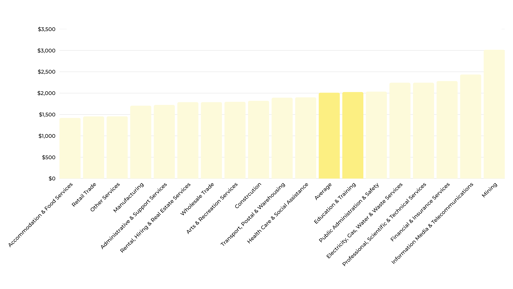What's on this page?
Jump to:
- Why Teachers Change Career
- 10 Transferable Skills from Teaching
- The Best Six Career Pivots for Former Teachers
- Six Steps to Successfully Change Careers from Teaching
- Student Success Stories from Former Teachers
- Final Thoughts: How We Can Help You Transition from Teaching
- FAQS on Changing Careers from Teaching and Education
Why Teachers Change Careers
As I mentioned above, the more I speak to teachers and educators about their career change goals, the better my understanding is of why they want to pivot to a new career.
Note: I don’t want to be too negative about teaching as a career. Teachers are a vital part of our society, and there are many brilliant educators out there who enjoy teaching as a life-long vocation. That said, there do seem to be some common themes among those who decide to find a new career after spending some years in a teaching role.
The most common reasons from my experience include:
- Burnout or stress: The emotional and workload demands of teaching can take a toll over time. It's not an easy job by any means.
- Desire for more flexibility: Many teachers crave better work-life balance and the flexibility to work in different locations or to take annual leave outside of the highly structured term-time calendar.
- Financial motivation: There are roles outside of education that offer higher salaries and better, clearer progression pathways.
- New challenges: After years in the same role, some educators want to apply their skills in new environments and to new challenges.
- Changing priorities: Family, health, and personal goals may prompt a reassessment of long-term career direction.
I have some of my best career-change conversations with teachers...
I've advised hundreds of people looking to change careers over the years, and typically, the conversations I have with teachers are some of the most productive.
Educators tend to have high education levels themselves as well as oodles of drive and ambition, not to mention high standards and the ability to perform under pressure. All of these are useful qualities to have when looking to switch or progress your career; so, it's no surprise the employment outcomes we see for the teaching professionals we work with are particularly excellent.
More and more teachers in Australia and New Zealand are changing careers...
At the end of 2025, ABC News reported that up to 50% of graduate teachers leave the profession within their first five years on the job.
The story is similar in New Zealand, with one-in-five new school leaders quitting within a year.

10 Transferable Skills from Teaching
I mentioned this right at the start of the article. As a teacher, you've almost certainly developed a host of valuable skills that will be highly attractive across a range of industries.
I feel that many people, including teachers themselves, underestimate the very high level of skills needed to be an educator. These are exactly what makes teachers or ex-educators stand out in the job market.
- Communication: Clear, concise, and engaging communication is as vital in almost every profession as it is when standing in front of a classroom of children.
- Organisation and planning: Managing classes, deadlines, and curriculum delivery requires high-level planning abilities.
- Adaptability: Teachers frequently adapt to new curriculums, technologies, and student needs. Especially in the world of tech, this quality will be very useful.
- Problem-solving: From classroom challenges to individual learning needs, teachers are skilled at creative solutions.
- Leadership and collaboration: Working with staff, parents, and students hones the leadership and teamwork skills that are needed in every workplace structure.
- Emotional intelligence: Interacting with students and staff from a range of backgrounds gives teachers a deep understanding of human behaviour. This means that they can navigate conflict and other complex interpersonal situations with empathy and care.
- Multitasking: Daily juggling of dense curriculum, challenging behaviour and other unusual workplace issues, make teachers excellent multitaskers.
- Public speaking: From addressing a small class of students to speaking in whole-school assemblies, teachers are able to present information clearly and concisely.
- People management: Teachers are in charge of students' behaviour and safety every time they step into a classroom - this makes them develop effective people management strategies.
- Creativity: As a teacher, you're constantly thinking of new and engaging ways to present information.
All of these skills make teachers and educators in-demand candidates across a wide range of sectors.
The Best Six Career Pivots for Former Teachers
Here are some of the most popular and rewarding career paths for those looking to move on from teaching:
1. Project Management
Why teachers make great Project Managers:
-
Strong organisational and planning skills
-
Experience managing multiple tasks and people
-
Clear communication and leadership abilities
Getting started: Look into entry-level certifications like APM Project Fundamentals or AgilePM® Foundation. These can help demonstrate your capability and fast-track your job applications.
2. Learning and Development (L&D)
Why it suits teachers:
-
Natural fit for those who love helping others learn
-
Combines education expertise with corporate training settings
Getting started: Consider qualifications in L&D or instructional design. Experience designing lesson plans is a great foundation.
3. Tech and IT Roles
Why teachers make great IT professionals:
-
Teachers often have experience using digital tools and platforms
-
Analytical and problem-solving skills translate well to roles like data analysis or IT support
Getting started: Explore entry-level courses in Data Analysis, Coding, or Cyber Security. Certifications like CompTIA A+ or CompTIA Data+ are a good first step.
4. Business Analysis
Why teachers make great Business Analysts:
-
Strong attention to detail
-
Effective communication and stakeholder engagement skills
Getting started: A business analysis course or certification (such as BCS Foundation Certificate in Business Analysis) can help you pivot into this analytical and strategic role.
5. Educational Publishing and Content Development
Why it suits teachers:
-
Deep understanding of curriculum and learning materials
-
Experience writing and editing content
Getting started: Build a portfolio of written or digital content. You can freelance or work with publishing companies focused on educational resources.
6. HR or Recruitment
Why it suits teachers:
-
Experience dealing with a variety of people and situations
-
Strong interpersonal and interviewing skills
Getting started: Consider a course in HR fundamentals or recruitment. Entry-level roles in talent acquisition or employee engagement are common routes.

Six Steps to Successfully Change Careers from Teaching
- Reflect on your goals and motivations: Take time to assess what you want from your next career. Is it more flexibility? Better pay? A creative outlet? This will guide your next steps.
- Research new industries: Look into sectors that align with your strengths and interests. Consider job descriptions and talk to people already working in those roles.
- Upskill or retrain: Many career pivots require new knowledge or certifications. Luckily, there are plenty of affordable and flexible online training options.
- Tailor your CV: Highlight your transferable skills clearly and match them to your target role. Focus on achievements that demonstrate results and impact.
- Grow your network: Connect with others on LinkedIn, join relevant industry groups, or attend career change webinars. A strong network can lead to job opportunities.
- Start small, if needed: You don’t have to land your dream job overnight. Consider freelance work, volunteering, or part-time roles to build experience and confidence.
Student Success Stories from Former Teachers
Over the 15 years that Learning People has been in business, we’ve supported just shy of 50,000 people who want to launch or change their career. We’re proud of our students’ success – seeing the people we work with find careers they love is what motivates us to keep doing this work.
Among these, we’ve supported many educators take the difficult but exciting leap into a new field. Take Mike for example, who we supported through a career change from being a teacher to being a Project Manager.
From Teacher to Project Manager
Mike transitioned from teaching into project management after enrolling on Learning People’s project management pathway, completing certifications including Agile Foundation, Agile Practitioner, APM PMQ and Change Management. With online resources, regular check-ins and our personalised career support, Mike quickly secured a project management role.
Final Thoughts: How We Can Help You Transition from Teaching
If you're a teacher thinking about a career change, you're not alone. This is one of the most common career pivots we see at Learning People. With your transferable skills, natural drive, and a willingness to learn, you'll be an excellent fit for many roles in the world of tech and beyond. Next steps are to explore training options and build your confidence, ideally with some career coaching.
Ready to make a change? Take a look at our flexible, online training courses to kickstart your career pivot to a career in Tech or Project Management. With Learning People, you can continue to teach in your current job while training for your next career move. You can learn online whenever you have time and at your own pace, so why not make the most of the upcoming Autumn holidays to do just that.
FAQS on Changing Careers from Teaching and Education
*This article was originally written by a Learning People Careers Advisor who works in our UK office in Brighton and Hove, Sophi Barnes. In this version, the original has been edited and adapted so it's relevant and helpful for audiences in the ANZ region.
Related Articles
 Preparing for the job market
Preparing for the job marketSoft Skills vs Hard Skills: Striking the Right Balance in Tech
Discover what soft skills are and why they’re vital for success in tech. Learn how communication, adaptability and emotional intelligence can future-proof your career alongside hard, technical skills.
Read More Changing Career
Changing CareerThe Best Career Pivots for Educators: How to Change Careers from Teaching
Teachers and educators will find that their skillsets are in high demand in other sectors. Learn more about how to change careers from teaching and which new roles might be a good fit.
Read More AI
AIHow to Prepare for AI’s Impact on Australia and New Zealand's Job Market and Careers
The "AI is stealing all the jobs" talk is scary. My best advice: don't panic, prepare. In this guide, I've used current statistics to tell a story of how AI is impacting Australia and New Zealand's job market, and how you can future-proof your career for this digital revolution.
Read More AI
AIHow to Learn AI to Future-Proof Your Career
There’s a lot of noise right now about AI taking jobs. And yes, AI is changing the way work is done in almost every sector. But the smartest response isn’t to panic, it’s to adapt. In this guide, I walk you through how to identify what AI skills you need, and crucially, how to develop them.
Read More

